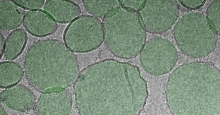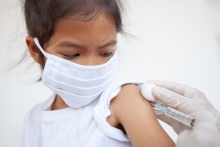Countries worldwide face challenges meeting the growing needs for long-term care services because of high costs. A study led by researchers from McGill University and Université du Québec en Outaouais shows that introducing nurse practitioners can significantly reduce costs and improve patient safety.


A group of proteins called 4E-BPs, involved in memory formation, is the key to unlocking the antidepressant effect of ketamine in the brain, according to researchers from three Canadian universities. The discovery could lead to better and safer treatments for certain patients suffering from major depression.

Finding could lead to potential therapies

MONTREAL, QUEBEC – Pfizer Canada has made a $600,000 gift to the McGill Interdisciplinary Initiative in Infection and Immunity (MI4) via McGill University and the McGill University Health Centre (MUHC) Foundation. The gift, which was announced today during the 2nd annual MI4 Scientific Symposium, will support innovation and life-changing research through the creation of the Pfizer Early Career Investigator Awards.

By Meaghan Thurston (Office of Research and Innovation)

By Shawn Hayward
Six McGill University Faculty of Medicine and Health Sciences researchers — Boris Bernhardt, Mark Brandon, Yasser Iturria-Medina, Jean-Francois Poulin, Jo Anne Stratton and Masha Prager-Khoutorsky — have received grants to support their work in the early-career stage, after being chosen from 150 talented applicants.
Brain Canada’s Future Leaders in Canadian Brain Research Program, anchored by a $5M gift from the Azrieli Foundation, enables paradigm-changing research of the brain to improve the lives of all Canadians.
Five projects led by McGill University researchers are included among the 79 receiving a total of $28 million in research infrastructure support through the Canada Foundation for Innovation (CFI) Exceptional Opportunities Fund. The announcement was made today by the Honourable Navdeep Bains, Minister of Innovation, Science and Industry during a news conference this morning.

Earlier today, a Quebec based consortium of research institutes (Génome Québec, Oncopole and IVADO) announced the winners of their first-ever “Omics Data Against Cancer” competition, and McGill research teams were dominant. In fact, of the five selected teams no less than four of them included professors from McGill.

Earlier today, the Quebec government announced the winners of its annual Prix du Quebec competition, a series of 15 awards in science and culture. Among them was Professor William Foulkes, Head of the Cancer Genetics Laboratory at the Lady Davis Institute, a member of the Cancer Research Program of the Research Institute of the McGill University Health Centre, and Director of the Program in Cancer Genetics at McGill University. Dr.

Changing makeup of a specific protein has the potential to neutralize the virus
Researchers from McGill University are part of an international team led by the University of Buffalo, which has discovered a technique that could help increase the effectiveness of vaccines against SARS-CoV-2, the virus that causes COVID-19. The group’s study was published recently online in the journal Advanced Materials.

Using a new technique, a team of McGill University researchers has found tiny and previously undetectable ‘hot spots’ of extremely high stiffness inside aggressive and invasive breast cancer tumours. Their findings suggest, for the first time, that only very tiny regions of a tumor need to stiffen for metastasis to take place. Though still in its infancy, the researchers believe that their technique may prove useful in detecting and mapping the progression of aggressive cancers.
COVID-19 Resources Canada, a grassroots organization co-founded by a McGill researcher, today announced it received a donation of $250,000 from the Trottier Family Foundation to facilitate Canada’s response to the pandemic. Since its launch in March 2020, the organization has developed two of the most comprehensive databases in Canada with more than 600 COVID-19 funded research projects and experts from over 25 Canadian institutions.

As countries struggle to contain the COVID-19 pandemic, vaccination uptake is a public health priority now more than ever. Efforts to increase vaccinations vary greatly around the globe. A new McGill-led study comparing policies around the world finds broad implementation of mandatory vaccination mandates. However, the penalties for failing to vaccinate differ significantly by country, ranging from fines to jail time.

A McGill-led multi-institutional research team has discovered that during memory consolidation, there are at least two distinct processes taking place in two different brain networks – the excitatory and inhibitory networks. The excitatory neurons are involved in creating a memory trace, and the inhibitory neurons block out background noise and allow long-term learning to take place.

Trust in public institutions is linked to fewer COVID-19 deaths, but trust and belonging to groups is associated with more deaths, according to a wide-ranging, McGill-led study of 30-day COVID-19 mortality rates in 84 countries. Greater economic inequality is also associated with COVID-19 mortality.
